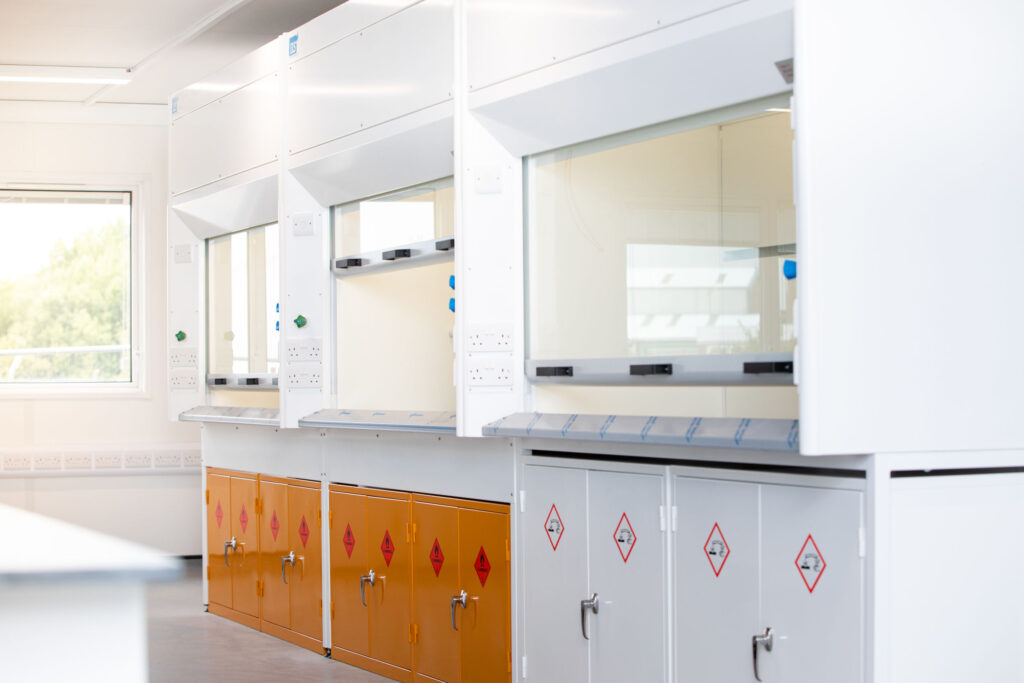Estimated reading time: 4 minutes
Introduction
As we face increasing energy costs and the urgent need to address the climate change crisis, it is important for us all to consider how we can make our homes and businesses operate more sustainably.
The science industry is energy intensive, large scale manufacturing plants require a lot of heat and cooling for their processes. The energy used for operational areas such as laboratories and offices can be overlooked in comparison. These are areas which energy savings can be made with careful design considerations.
Fume cupboards offer the scope to reduce wasted energy. These vital pieces of lab equipment can be one of the most consuming in the laboratory. These cabinets are vital for the safety of the users, drawing air out of the room, through the camber and into the atmosphere.
The problem with CAV Fume Cupboards
Typically, fume cupboards are specified with Constant Air Volume (CAV) extraction. These units draw a constant volume of air regardless of sash position. This is achieved either when the sash is open and through the opening or while the sash is closed, via a bypass grill that draws air through the chamber. For a typical set up of 3No. 1500mm fume cupboards with a face velocity of 0.5m/s, 3240m3/hour will be extracted. Which for a typical lab with a floor area of 25m2 means that the entire volume of air in the lab would be replaced 50 times an hour (ACH) or every 1.2 minutes.
This is a considerable rate of air change for a room, especially when you consider that in order for the lab users to be comfortable, the air will have to be heated/cooled to comfort which will use an enormous amount of energy.
The Solution

There is a solution to this problem. By removing the bypass grill and installing an actuated damper along with some clever controls, it’s possible to vary the volume of air extracted depending on the sash height. This is called a Variable Air Volume extraction system. The system constantly monitors face velocity and aims for a set point, typically 0.5m/s but could be as low as 0.3m/s. As the sash is lowered, the face velocity increases, the control system closes the damper, reducing the volume of the extracted air.
For the same example as earlier, if all sashes were fully open, the full 3240m3/hour would be extracted. If the sashes are closed, this would reduce to 647m3/hour. For the same lab as before, this would reduce the ACH from 50 to 10, which is still suitable for a laboratory environment but saving a considerable amount of conditioned air.
It is clear to see that switching to a VAV fume cupboard will reduce energy bills and although there is a higher initial capital cost, the operating cost of the fume cupboards will be significantly reduced.
A note on bleed air systems:
There is a problem with turning down the volume on a bank of fume cupboards. The extraction fan is set at a constant speed. As more dampers are closed, the velocity of the air leaving the stack, otherwise known as efflux velocity will be reduced. BS EN 14175-2 requires a minimum of 7m/s but ideally 10m/s. In order to maintain this velocity a “bleed” damper close to the inlet of the fan can be opened and closed controlled by a duct pressure controller. If the VAV dampers are all closed, the duct pressure will increase and in turn the bleed damper will open to reduce the pressure, maintaining the correct discharge velocity.
How we implement this
We use TEL AFA4000/E VAV controller, this is an easy to use controller. Once programmed and commissioned by one of our engineers, there is a single button for operation. The user can cycle through:
- VAV Run
- VAV Max – damper fully open.
- VAV Min – usually 20% closed and alarm deactivated.
If you would like to find out more about a VAV solution for your laboratory, please get in touch today. Alternatively take a look at our VAV fume cupboard product page.
Assumptions
Room volume calculated, 5m(W) x 5m(D) x 2.6m(H).
Fume cupboard sash opening 1.2m (W) 0.5m (H)



